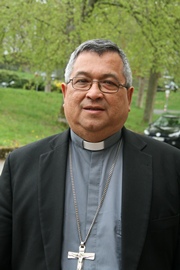|
Division and hostility in Venezuela During a visit to international Catholic pastoral charity Aid to the Church in Need (ACN), the Bishop of Trujillo, Venezuela, Oswaldo Azuaje, talked about the serious situation his country was in at the present. "Politically, the country is suffering from its division into two almost equal halves, which has resulted in a major separation and serious split,” Bishop Azuaje stated.
According to the Bishop, this situation does not affect the whole of society but large portions of it. He said it was even undermining family relationships, stirring rancor and enmity. Bishop Oswaldo Azuaje stressed the importance of the "dialogue for peace and for the sake of peace." He further commented that democracy "does not only consist of going to the polls in order to elect a political leader. It is also the ability to live in diversity, to respect those who hold a different opinion and to listen." "Blessed are those who have 'a mouth to listen.' After all, we often use our mouth to attack. But it is also important to have a firm resolution to build a better country for all, regardless of who governs.” “In Venezuela freedom is hanging by a thread. That's why I ask my compatriots and people who love Venezuela to pray for peace and reconciliation," the Bishop emphasized. After accusations had been made in public that the Venezuelan government was dismissing officials for their political views, the Venezuelan Bishops' Conference also demanded in a declaration on May 2: "Repression, victimization, harassment und unjustified dismissals of public service employees as well as violence for political reasons must stop." The declaration also related to the incident in the National Assembly a few days previously. A number of opposition deputies had been the target of a bloody attack after they had protested against ratification of the decision by the President of the National Assembly, Diosdado Cabello, to deny them the right to speak. Such cases of physical aggression "are an act of violence which makes us sad and ashamed. Venezuela doesn't deserve such a degrading spectacle! Such actions distort the identity of parliament," the statement of the Bishops' Conference stressed. The stated closed with a call to prayer and to work for peace, respect and forgiveness. The difficult situation in Venezuela, which has existed for years, deteriorated further after the last national elections on April 14. In the presidential elections Nicolás Maduro was elected by a slim majority. The opposition, led by Henrique Capriles, is challenging the validity of the elections, however, and is demanding a recount. They refuse to recognize Nicolás Maduro as the legitimate President of the country until the results of the election review currently being conducted by the National Election Commission are known. |
|
|

 “Unfortunately Venezuelan politics have in the past few years consisted of disputes, not simply debates but downright hostilities."
“Unfortunately Venezuelan politics have in the past few years consisted of disputes, not simply debates but downright hostilities."